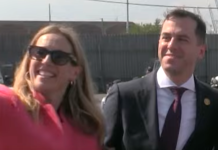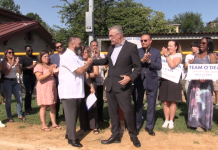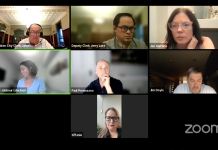Gov. Phil Murphy (D) presented his plan for a middle class budget in Union City, saying the pillars of the plan include fiscal responsibility, public education investments and taxing the wealthy.
At one point during the town hall, the governor took questions from the audience, and a Union City High School student named Marlon had the privilege of standing right next to the governor to ask him what programs are available for struggling and low-income families.
It proved to be a moving moment, as Marlon choked up with tears and simply said to the governor, “I just want to be successful.”
On the cost savings front of the plan, the governor stressed how he and his administration worked with state union leadership to find over $1 billion in cost savings in health care.
“We have to prove to everyone that we know how to run the state and save money. So we worked with our union brothers and sisters and we found savings of $1.1 billion,” said Murphy.
He was quick to note that the savings, however, wouldn’t compromise union members’ heath care coverage.
“By the way, that wasn’t we’re taking away good coverage from our public sector employees. It wasn’t that we’re making them pay more so we could pay less, no. We protected what their paying, we protected their health care coverage. But we found ways to make it more efficient so the employee does better and the state does better, and as a taxpayer you all do better,” Murphy said.
He then noted that the second pillar of his middle class plan is that the state has to demonstrate fiscal responsibility in light of multiple downgrades of the state’s finances by credit rating agencies.
“We have to draw a line under that. Last year we presented a big surplus in our budget and this year an even bigger one. I’m not sure that we’re going to start seeing ourselves being upgraded anytime soon, but we have to draw a line under that and say enough of the borrowing from tomorrow to pay for today.”
He then said that the third pillar is the most important of the four pillars–additional investments in K-12 public education.
“It’s an all-in investment in the middle class in this state. Almost every step we take is informed by that notion,” exclaimed Murphy.
Additionally, the governor said that the state will be allocating hundreds of millions of dollars for public schools.
“In this budget, in this blueprint, over $200 million more than even last year, which was $350 million more than the year before in K-12 public education.”
And the fourth pillar to raise taxes on the wealthy may prove to be the most difficult to pass in the budget because the legislature may balk, but when he announced it he received a standing ovation from the audience.
“Tax fairness. If we’re serious about all-in investments in the middle class, we have to stop making the middle class bear the price and the burden of that investment. It’s only fair,” said Murphy.
One way he hopes to achieve that is to tax businesses who do not offer a health care plan to its employees.
“If you’re a company and you refuse to give your employees a health care plan, and you got 50 or more of your employees that are on Medicaid as a result, meaning that the state and the federal government are paying for their health care, we are going to ask that company to pay $150 per person who is on Medicaid to help us share that burden,” explained Murphy.
The town hall was supposed to start at 6 p.m., but it didn’t kick off until almost 7 p.m. because the governor spoke to reporters in Trenton soon after it was announced there weren’t enough votes in the legislature to pass a bill to legalize recreational marijuana.
The governor took several questions from the audience after presenting his plan and was asked about his public stance on the issue.
“I believe medical marijuana, which we have artificially held back, is hugely helpful both as an alternative to drugs like Percocet, and if you are in recovery it has proven to be an invaluable asset. The prior administration had really held back medical marijuana, we’ve opened it up now from 15,000 people to 45,000 people [for treatment]. It really should be around 150,000 to 200,00 people who should be enrolled,” began Murphy.
He then mentioned that his administration purposely didn’t “open up” medical marijuana enrollment and treatment pending the vote that ultimately took place yesterday.
“We’ll likely, aggressively, further open up the medical regime in the next day or two. We have six [alternative treatment centers], which is way too few. We already took a step to add another six [and] we’re going to have a much bigger number in the next day or two,” said Murphy.








